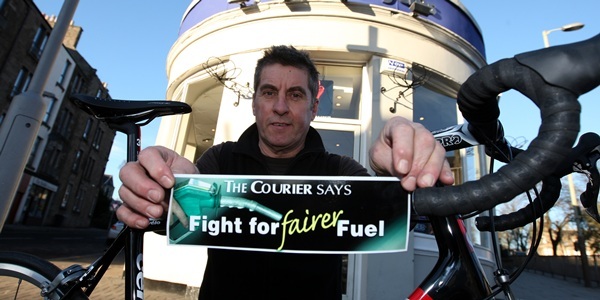Motorists should swap petrol for pedal power as the price of fuel continues to soar, cycle shops have said.
The Dundee shops are adamant that ditching the driving seat for the saddle is now the way to travel to work, beat congested roads and save money.
Although many people already cycle for exercise or as a hobby, technological advances and the financial argument mean many are regularly cycling instead of taking the car.
However, retailers believe that, with fuel prices soaring and little respite in sight, taking the bike to work may become a more and more sensible way of commuting.
John Jackson, manager of Bike Worx in Exchange Street, said, “It’s a cheaper, healthier way of getting to work. Not many will want to cycle more than 10-12 miles on a round trip and you have to be realistic.
“Certainly you won’t want to do a 40-mile journey but if you live in Broughty Ferry then pedalling to work is a lot more fun than driving.”
Although the benefits of ditching the car are obvious, the drawbacks are equally apparent.
Scotland is not famed for its good weather and, while dashing to the car in the rain may seem miserable enough, enduring such conditions on a bike are something that surely only cycling die-hards could describe as “enjoyable”.Fuel excuseHowever, Mr Jackson argues otherwise, saying many people in this country will almost look for an excuse to take the car, regardless of cost.
“I was in Germany and the weather was terrible but even then people were just pedalling on,” he said. “The weather doesn’t put them off and we shouldn’t be using it as an excuse.
“We have a bike at just over £400 that would be an ideal commuter bike and that’s not a lot when you think of how much petrol you shell out for every week. You’ve got to think about clothing as well but even then it’s still a lot cheaper than driving a car.”
Usability of modern cycles is vastly greater than before, thanks to lightweight materials and better construction methods.
However, Bryn Williams of Forfar Road’s Nicholson’s Cycles believes older people in particular are unaware of such advances and still see cycling as a chore instead of a relatively stress-free means of getting about.
He said, “Many people aren’t aware of big developments in the last five years and the average age of a new bike buyer is probably 50-plus.
“Men and women who have taken early retirement and had bikes when they were younger want to take it up again. They’re not inclined to go to the gym. I think credit should also go to the local government who have done a lot of work on cycle paths.”
Firms have long been telling staff to “get on your bike,” with many signed up to the government Cycle to Work scheme.
The initiative, that effectively sees the government subsidise bikes through employers, was hailed by Mr Williams as a means of getting more people into cycling, saying, “You’re probably talking about hundreds of thousands of sales to the industry.
“As the mornings get lighter and the days get longer you’ll soon see places like the Perth Road and Riverside with plenty of cyclists on them.”
Although admitting that Cycle to Work sees retailers missing out on a percentage of profit, Mr Jackson welcomed its impact, adding his hope it may encourage people to use bikes.
